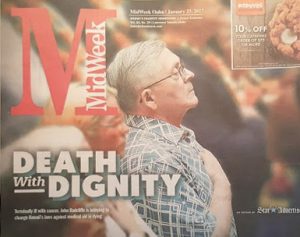THIS PAGE IS NO LONGER BEING UPDATED since our bill passed in 2018 and was activated on January 1, 2019! Thank you to everyone who somehow participated during our 25-year effort.
Fresh breath of life does not end lobbyist’s fight over death
By Lee Cataluna
August 6, 2017

PHOTO CRAIG T. KOJIMA
On July 10, surgeons removed part of John Radcliffe’s colon. As of now, the cancer in his colon is gone. But, he’s telling friends, don’t get too excited. It’s not a reprieve. John H. Radcliffe, a retired Hawaii lobbyist who became, as he puts it, the “poster child” for legalizing medical aid in dying in Hawaii, got some astounding news last month. MORE
June 7, 2017
Civil Beat Poll: Support Is Strong In Hawaii For Medical Aid In Dying
Legislators kept the issue at bay again last session, but two-thirds of poll respondents say it’s time to act.
By Nathan Eagle
Nearly two-thirds of Hawaii voters who responded to The Civil Beat Poll want the Legislature to pass a bill next year to legalize medical aid in dying for terminally ill adults. Legislators came close to taking that action during their last session, which ended May 4, but a House committee chaired by Rep. Della Au Belatti killed the measure without allowing a vote in the House after it had cleared the full Senate on a 22-3 vote. Most House members would not say where they stood on the issue. More HERE
-###-
April 5, 2017
Island Voices
‘Cowards’ killed medical aid in dying
By Teresa Shook
Hawaii’s “Death With Dignity” Bill has been shelved. The bill would have allowed terminally ill people to have a choice to die without suffering. The title does not refer to the notion some people have that choosing to end life prior to its natural occurrence is the “coward’s way out.” The “cowards” are those who refused to support the bill. No matter which side of the fence our local politicians lean on, the “politics as usual” mentality will fail. The weight of the Resistance against entrenched systems that no longer serve the people will create a tipping point that breaks the stranglehold. Make no mistake — each and every political representative will be held accountable.
This bill asks nothing more than to allow those who are terminally ill to have control over their dying process. Who can argue against that? Some say their God thinks it’s a sin. But voters in Hawaii represent many beliefs and cultures. Passage of the bill would allow the option for those whose beliefs are not conflicted by such matters. Politics has no business basing decisions on religion — covertly or overtly.
Clearly those who failed to support the bill have never sat by the bed of a loved one with a terminal illness watching them slowly lose their identity to pain and suffering. The loved one wishes they could end the suffering their family endures — the family wishes they could end the suffering for their loved one. The memory of that event never fades. I know.
My younger sister, Brenda, contracted a virus that caused her to have cardial myopathy just before her 30th birthday. It was a fluke. A random event. She had the flu and then suddenly she was dying. There was no cure — unless a heart donor became available — which at that time (20 years ago) was rare. There was a long waiting list. They stabilized her at first but eventually she became so sick she had to be hospitalized in hopes that a donor would become available.
She became weak; it was difficult for her to talk. Her skin turned the color of bleached bones with the papery feel of parchment. She said she wanted to die. I was helpless to save her and helpless to grant her request. The days passed. They hooked her up to a respirator. They hooked her up to a heart machine that sucked the blood out and back in. The whoosh whoosh of the respirator — the suck, suck of the heart machine — will never leave me. They pumped her full of steroids. Her body ballooned up like a blowfish. Her organs started failing. Whoosh, whoosh. Suck, suck. My father punched a hole in the hospital wall. My mother disappeared inside herself, never to return.
Eventually from my shell-shocked place I asked the doctors “could she survive a transplant if a heart donor became available?” “No,” said the anonymous white coats floating all around our periphery.
She had signed a declaration of “no artificial means of support.” We unhooked her from the machines to end her suffering. By then my beautiful, crazy, full-of-life sister was an unrecognizable blob of dehumanized flesh. She died within minutes of “unhooking” her. She should have been allowed the choice of “death with dignity.”
Each politician who fails to support this bill should sit by a dying person and say, “I voted against the ‘death with dignity’ bill. I think you and your family should suffer.”
Because that is what your failure to act will cause.
Teresa Shook, of Maui, is founder of the Women’s March Washington.
Original story behind pay wall HERE
Thursday April 6, 2017
Most Hawaii House Members Won’t Say Where They Stand On Aid In Dying
The House Health Committee’s deferral of the bill let other members off the hook on making their position on the issue known to the public.
By Nathan Eagle & Natanya Friedheim
When it comes to one of the most high-profile issues before the Legislature — medical aid in dying — most House members are remaining silent about their position. Civil Beat called all 51 members to find out where they stood on a bill to let doctors prescribe lethal drugs to terminally ill patients after the Health Committee, chaired by Rep. Della Au Belatti, shelved it last month without a vote. The Senate had passed it two weeks earlier, 22-3. More than 30 representatives did not return messages seeking information about whether they support or oppose aid-in-dying legislation. Read the entire story with many photos HERE.
-###-

March 25, 2017
Abercrombie slams House for shelving death bill
By Sophie Cocke
ASSOCIATED PRESS
Former Gov. Neil Abercrombie said House members were dodging their responsibilities as elected representatives and trying to skirt controversy by stopping a bill that would allow terminally ill patients to obtain prescriptions for lethal doses of medication in committee before it could go to a full vote on the House floor.
Former Gov. Neil Abercrombie is blasting a House committee for shelving a high-profile bill that would allow terminally ill patients to obtain prescriptions for lethal doses of medication and says lawmakers should resurrect the measure through a rarely used clause in the state Constitution that would allow for a full floor vote on the bill.
On Thursday, House Health Committee Chairwoman Della Au Belatti (D, Moiliili-Makiki-Tantalus) recommended at the end of a three-hour hearing that Senate Bill 1129 be deferred, a decision that the other six members of her committee signaled they supported. A decision to defer a bill is meant to kill the measure for the year.
“When I saw that this was deferred, I thought, how do you defer something like this? You can’t defer death. It comes to every single one of us,” Abercrombie said Friday in an interview with the Honolulu Star-Advertiser. “It’s not a resolution on Mother’s Day or National Dental Week.”
Abercrombie said House members were dodging their responsibilities as elected representatives and trying to skirt controversy by stopping the bill in committee before it could go to a full vote on the House floor.
The bill was a top priority of the Hawaii Democratic Party and passed the full Senate by a 22-3 vote earlier this month. Both the House speaker and Senate president signaled their support of the measure at the beginning of this year’s legislative session, and several past governors, including Abercrombie, had come out publicly in support of the bill.
“In the state Legislature, at a minimum then, it is incumbent upon the Democratic Party representatives to vote on major issues. To run away from it — then why are you in the Legislature? What are you there for?” he said.
“To simply say there is division on an issue, let’s run away — no wonder people get disgusted with politics,” he continued.
Abercrombie suggested that the issue of physician-assisted death was on par with such weighty issues as gay marriage and abortion and should be given the same attention. He said he wasn’t asking legislators to do something he hadn’t done, noting the special session he called on same-sex marriage, which resulted in the passage of Hawaii’s Marriage Equality Act.
“I called a special session precisely because I realized there would not be a vote if I did not do it,” he said. “Believe me, I sat in the governor’s conference room listening to many legislators saying, ‘Please don’t do this,’ some of them very candidly saying, ‘We don’t want to take a vote, we don’t want to put ourselves on the line.’”
Supporters of SB 1129 have argued that terminally ill patients should have the right to decide how and when to die when they feel their suffering has become unbearable. The bill, which was modeled after Oregon’s Death With Dignity Act, enacted in 1997, would apply to residents who have been diagnosed as having six months or less to live.
But members of the Health Committee on Thursday raised a host of concerns about the bill, such as whether there were adequate safeguards in place to protect seniors or the ill from being pressured or tricked into taking such medication. Health Committee members also questioned experts about whether doctors could accurately predict when someone had just six months left to live and raised concerns about misdiagnosis of illnesses.
Belatti said she was not aware of any effort to recall the bill from her committee for a floor vote, an act she said would be “extraordinary.”
“It’s not incidental reasons why the bill was deferred,” she said. “There were some very good questions.”
House Majority Leader Scott Saiki said that to recall the bill, one-third of the House, or 17 members, would have to vote in favor — a motion that couldn’t happen until after Wednesday, which would mark 20 days from the date the bill was referred to the Health Committee.
But he said he wouldn’t be in favor of such a motion.
“It was heard, it was considered and the decision was to defer it,” he said. “I respect the decision of the committee.”
As to Abercrombie’s comments, Saiki said, “I would say that I really don’t need his advice on how to manage legislation at the Legislature.”
House Speaker Joe Souki declined to comment for this story.
NOTE: Read original story on line HERE
-###-
Navigating The Journey is a live weekly broadcast with host Marsha Joyner that explores the options and choices of end-of-life issues from religious, cultural, medical and legal perspectives. The shows are archived for later viewing on Youtube HERE.
-###-

Sunday, February 26, 2017
Editorial| On Politics
If Souki’s tallies are right, medically-assisted-death bill has fighting chance to survive
By Richard Borreca
House Speaker Joe Souki is tallying up the votes for SB 1129, which would allow a terminally ill person to get a prescription for medication to be self-administered to end the patient’s life. It will be a close vote, writes Richard Borreca. Legislators will get little political benefit, but the public benefit of voting for compassion and empathy is immense.
House Speaker Joe Souki is tallying up the votes for SB 1129, which would allow a terminally ill person to get a prescription for medication to be self-administered to end the patient’s life. It will be a close vote, writes Richard Borreca. Legislators will get little political benefit, but the public benefit of voting for compassion and empathy is immense.
One of the Legislature’s most canny and astute members, House Speaker Joe Souki, pulls a pile of House roll call sheets from his desk drawer.
“This is my bible,” he says with a smile.
The sheets are his own projections on how his members will vote on his important bills.
Parsing how his 44 House Democrats will vote is both higher mathematics and an art form for Souki.
Right now he is tallying up the votes for Senate Bill 1129, which would allow a terminally ill person to get a prescription for medication to be self-administered to end the patient’s life.
Souki voted for a similar bill when it passed the House in 2002 and now he is doing all he can to have the bill become law.
“This has to do with compassion. Pain is not a birthright,” Souki said in an interview.
“They should be given the right to do what we think is right. A number of churches don’t think it is bad to help a person in their eternal journey.”
Fifteen years ago, an assisted suicide bill cleared the House and then was bottled up in the Senate, only to be defeated with 14 “no” votes.
Then-Gov. Ben Cayetano had assembled a special study group to recommend a bill. The committee took two years to offer up its recommendations and it formed the basis for the push.
Hawaii church groups, mostly led by the Catholic Church, opposed the bill and had a skilled lobbyist working in opposition.
Now supporters of the bill have no major institutional supporter. If you support assisted suicide, no one has your back; you are voting on your own.
But remarkably, the effort has become the key issue for one of the state’s most powerful lobbyists, John Radcliffe, who has been diagnosed with stage four colon and liver cancer.
“On the outside I should have died by July of 2016, and here it is February of 2017. So far, so good,” Radcliffe said in testimony.
With what time he has, Radcliffe is launching his most passionate lobbying campaign. He was Souki’s guest of honor when the House opened its first session in January and he was also the Senate Health Committee chairwoman’s guest of honor in the Senate. So top legislators were sending a strong signal of their support for the bill.
“This is just one more small advance for the remarkable Catholic philosophy of St. Thomas Aquinas who wrote that ‘Mercy is the compassion of our heart when considering the misery of another person,’” Radcliffe, a Catholic, said in an interview. “It was Aquinas’ view that Man’s justice was never complete without God’s mercy, and that God’s mercy perfects Man’s law.”
Radcliffe is predicting victory, saying, “This is an organic national movement.”
Souki, however, is more cautious. He is also Catholic and knows the power held when Hawaii’s Bishop Larry Silva appears in a front-page Hawaii Catholic Herald piece urging Hawaii parishioners to “pray fervently that physician-assisted suicide will not be permitted in our state.”
Still Souki goes back to his vote tally bible and ticks off every possible Democratic vote against the bill that needs 26 votes to pass.
“We have 44 members — 30 up but even this … it could go down to 28,” he predicted.
It will be a close vote. Legislators will get little political benefit, but the public benefit of voting for compassion and empathy is immense.
Richard Borreca writes on politics on Sundays. Reach him at [email protected].
Read original story HERE
-###-

February 15, 2017
Medical Aid In Dying Bill Stays Alive In Hawaii Senate
The proposal, which didn’t even receive a hearing last year, has cleared one committee and its prospects seem good in a second.
By Natanya Friedheim

Death With Dignity Hawaii staffmember Marsha Joyner awaits the Senate Health Committee hearing.
“‘I’ve always thought this was a choice I wanted for myself,” said Sen. Rosalyn Baker, D-Maui, the committee’s chairwoman. “I’ve seen too many of my friends with advanced stages in cancer waste away when they really wanted to be able to have that final control. I think choice in all areas is very, very important.’ House Majority Leader Scott Saiki, D-Oahu, says it has a 50-50 chance of passing in his chamber.’”
HONOLULU – Proposals for medical aid in dying didn’t even get a hearing in the Hawaii Legislature last year, but times have changed. Senate Bill 1129 would allow licensed physicians to prescribe a lethal dose of medication to terminally ill, competent adults who have a prognosis of six or fewer months to live. It was passed unanimously Wednesday by the Committee on Commerce, Consumer Protection and Heath. More HERE
-###-
![]()

February 15, 2017
Hawaii bill would allow medical aid in dying
‘The power to choose’: After impassioned testimony, ‘death with dignity’ bill advances in Senate. To become law, Senate Bill 1129 still must pass the full Senate and House and be signed by Gov. David Ige. It has overwhelming Senate support.

Joe Herzog, who has stage four prostate cancer, tells his story to lawmakers today in Honolulu. Herzog is supporting a bill to allow adults who have a terminal illness to get a prescription for medication to end their lives.
As a stage-four prostate cancer patient, Joe Herzog has been considering how he might die and knows he could face intractable vomiting and starvation in the final days or weeks of his life. As a retired veterinarian, Herzog believes he should have the same right that pet owners have to enable their feline and canine companions to die peacefully at home with medication. More HERE.
-###-
![]()
A better choice
February 1, 2017
By Richard Creagan M.D.
My Turn

The people of Hawaii have been asking for a medical aid in dying option (also known as “death with dignity”) for almost 20 years. Today, 80 percent of Hawaii residents believe medical aid in dying should be an option in our state. Medical aid in dying is an end-of-life medical practice in which a terminally ill, mentally capable individual who has a prognosis of six months or less to live requests, obtains and — if his or her suffering becomes unbearable — self-administers medication that brings about a peaceful death. More HERE
-###-

January 25, 2017
Longtime lobbyist John Radcliffe, 74, terminally ill with Cancer, is working to change Hawaii’s laws that prohibit access to life-ending medication when suffering becomes unbearable. Read the complete Midweek article HERE
-###-
January 23, 2017
Editorial
Let The Terminally Ill Exercise Personal Freedom
Hawaii has been grappling with this issue for 20 years. It’s time to lay it to rest.
By Civil Beat Editorial Board
Nothing gets people more hyped up than when the state’s role either allowing or forbidding a deeply personal and morally ambiguous freedom comes into question. This legislative session, the issue of “medical aid in dying” — when a doctor is allowed to prescribe life-ending medication to a terminally ill patient — promises to do just that. The issue has already proven itself to be polarizing and the debate about it is often heated, personal and annoyingly self-righteous. More HERE
-###-

January 19, 2017
Prayers, music kick off new legislative session
By Kevin Dayton and Sophie Cocke
“In opening remarks, [House Speaker Joe] Souki also urged his colleagues to approve a “death with dignity” measure, although he recently acknowledged in an interview it may take more than one year to convince the 76-member Legislature to approve the idea. Souki, 83, promised to introduce his own bill for what some describe as “compassionate choices” in dying, meaning establishing a way to provide legal medical aid in dying for people who are terminally ill and mentally capable. John Radcliffe, a longtime lobbyist who is advocating for a death-with-dignity proposal, sat in the front row on the floor of the state House and applauded when Souki spoke of the bill. Radcliffe suffers from liver cancer and is a longtime friend of Souki.” More (behind pay wall) HERE
-###-
January 18, 2017
Maui’s Souki takes gavel for 12th time as House speaker
Hospital transfer, right to die, crowded roads and prisons all part of address
“His [House Speaker Joe Souki]] call for discussion on the issue of allowing compassionate care or the right to die with dignity appeared to be more personal. Souki said that his longtime friend, lobbyist John Radcliffe, was sitting in the well of the House as he gave his address; Radcliffe has inoperable colon cancer and is terminally ill. I don’t know how long the good lord is going to keep him in this world,” Souki said Wednesday afternoon, adding that Radcliffe has called for a right to die measure. “I have a lot of people who call who want that,” he continued. “I am doing that for them because they are close to me. I am doing this for society as a whole.” Souki told his fellow House members that “those who are suffering from a terminal illness and are of sound mind should be given the opportunity to decide how they will end their own lives.” The speaker added that the measure also would relieve doctors of the risk of criminal charges and loss of license. Souki, 83, said he would like the option for himself. “I am not sure I will have the courage to make the decision when it comes,” he said. “Who knows if at the end I have an illness that is terribly painful.” Read the complete article (no pay wall) HERE.
-###-
January 13, 2017
Death And Taxes: Two Certainties For This Year’s Hawaii Legislature
By Chad Blair
Can a longtime lobbyist sick with cancer persuade the Hawaii Legislature to pass medical aid in dying legislation? If anyone can do it, it might be John Radcliffe. He has represented clients with interests as varied as gambling, genetically modified foods and vacation rentals. After decades in island politics, Radcliffe has a lot of friends in the big square building on Beretania Street. Now terminally ill, he wants patients like him to have a say in end-of-life decisions. While the proposal has failed several times before, primarily because of the opposition of religious organizations and some medical groups, six states including California now permit an end-of-life medical care option. More HERE
-###-
Thursday, January 12th 2017
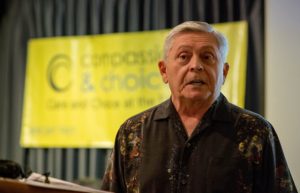
Dying Cancer patient John Radcliffe has filed lawsuit
Aid in dying movement files suit to push for change to Hawaii law
By Shawn Ching, News Anchor / Reporter
A group advocating for the passage of medical “aid in dying” bill is also turning to the courts to see that Hawaii law allows terminally ill patients to end their own lives. The group, Compassion and Choices Hawaii, along with terminally ill cancer patient John Radcliffe and his doctor have filed a lawsuit against the state and the city prosecutor on the issue. The lawsuit hopes to have the court clarify that medical aid in dying, also known as physician-assisted suicide, is not a crime under Hawaii law. Complete video and text HERE
-###-
Thursday, January 12th 2017
Should people be allowed to end their own lives? A Hawaii lobbyist with Terminal Cancer wants to make that choice with the help of a physician. As KITV’s Nicole Carvalho reports, the decision to do that is now up to lawmakers. See video story HERE
-###-
January 12, 2017
Dying Cancer Patient Leads Suit Asserting Hawaii Law Allows Medical Aid in Dying
Alston Hunt Floyd & Ing and Compassion & Choices filed suit on Wednesday on behalf of a Hawaii resident with terminal cancer, John Radcliffe, and a physician asserting the Hawaii constitution and existing state law allow the practice of medical aid in dying. Medical aid in dying gives mentally competent, terminally ill adults the option to request a doctor’s prescription for medication they can take to peacefully end an unbearable dying process peacefully. Read more HERE
-###-
December 29, 2017
Listen up legislators: It’s time to quit forcing unnecessary suffering and expense on terminally ill people who want a different option.
By Kathleen Kozak
In a recent study conducted by researchers at Stanford University and published in the Journal of Palliative Medicine, 76.5 percent of Hawaii residents surveyed support physician-assisted death. This year in the Legislature, incoming Sen. Karl Rhoads plans to propose a bill to legalize this action and join six other states (California, Oregon, Montana, Washington, Vermont and New Mexico) that already allow doctors to prescribe lethal doses of medication for the express purpose of allowing patients to end their lives. Seventy-six percent of Hawaii residents — this seems like a much different story than in 2002, the closest the measure ever came to passing in the islands when it failed by only three votes. Now, four former governors have petitioned publicly to have this bill passed. Learn more HERE
-###-
Wednesday, December 14th 2016
Lawmakers to take up ‘death with dignity’ bill in new year
By Jim Mendoza, Reporter
View the video story HERE
-###-
December 14, 2016
Navigating the Journey
Death with Dignity Society – End of Life Advocacy with Scott Foster
Navigating the Journey is dedicated to assisting people talk about their wishes and options for end-of-life. Scott Foster, co-founder and Communications Director of the Hawai`i Death With Dignity Society joins Marsha Rose Joyner to discuss his work expanding options at the Hawai`i Death With Dignity Society.
-###-
Navigating the Journey
View archived shows HERE
###
December 15, 2016
A letter signed by former Hawai`i Governors George Ariyoshi (1974-1986), John Waihee (1987-1994), Benjamin Cayetano (1995-2002) and Neil Abercrombie (2010-2014) urging the Hawai`i State Legislature to hear and pass an“End of Life Options Act” in 2017 was published in the Island Voices section of the Honolulu Star-Advertiser on December 15, 2016. Read the letter HERE.
-###-
May 21, 2016
Death with dignity advocate seeks right to choose
By Pat Gee
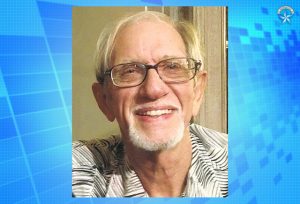
SCOTT FOSTER Co-Founder, Hawaii Death With Dignity Society “I’ve witnessed so many older people whose quality of life goes to nothing, especially in those last months.”
For Scott Foster, getting a law passed in Hawaii to allow terminally ill people to end their lives is a personal matter. The 73-year-old co-founder of the Hawaii Death With Dignity Society has been working to attain such a law for 30 years. “I’m aging and it’s a very real issue. … When I can no longer take care of myself, it becomes a quality-of-life issue,” Foster said, adding that with no relatives and few close friends, he wonders who would be able to care for him. “I want full control over my end of life as best I can.” Foster, the recently elected chairman of the Democratic Party of Hawaii’s Kupuna Caucus, ran on a platform of senior health care and end-of-life issues, including a proposed “death with dignity” law that would allow a doctor to write a prescription for a lethal drug. More HERE.
-###-

May 21, 2016
End-of-life talks with family are key
By Pat Gee
Start talking to relatives about how they want to die before they become critically ill. That’s Jade Young’s strongly held take on the matter. As a hospice educator and chaplain who has witnessed many families, including her own, struggle with end-of-life decisions during a time of anguish, Young advises, “An advance health care directive is a must, must, must.” Young was among the panelists at an event titled “End-of-Life Options and Dying With Dignity: Next Steps,” which was moderated by Mary Steiner of Compassion & Choices Hawaii. About 60 people attended the monthly Open Table discussion Tuesday, hosted by The Interfaith Alliance Hawai‘i at the First Unitarian Church of Honolulu. More HERE
-###-
May 16, 2016
DEMOCRATIC PARTY OF HAWAII ACTIVATING ON DEATH WITH DIGNITY ISSUE
Our Co-Founder Scott Foster Elected Chair of the Party’s Powerful Kupuna Caucus
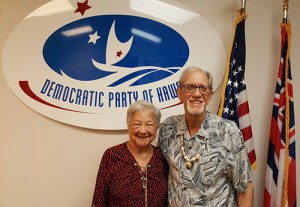
Newly elected Vice-Chair, Helen Raeur and Chair, Scott Foster of the Democratic Party of Hawaii’s Kupuna Caucus.
Running on a platform of senior healthcare and end-of-life issues including Death With Dignity, the Hawaii Death With Dignity Society’s co-founder and Communications Director Scott Foster has been elected Chair of the powerful Democratic Party of Hawaii’s Kupuna Caucus. The organization represents many thousands of senior Democrats and their families across the state.
Foster said, “When the original Hawaii Death With Dignity Society members first set out to educate the public in Hawaii about this once very controversial public policy issue, we might have never imagined that we would still be working on it over 25-years later! But laying that early groundwork has finally paid off and we strongly believe that 2017 is the year Hawaii will join Oregon, Washington State, Montana, Vermont and California in having a Death With Dignity law in place. We welcome all who have joined with us to see this happen and we salute and honor those who have come before.” Learn about some of those amazing personalities HERE.
It should also be noted that the Democratic Party of Hawaii (DPH) has added a new supportive resolution to the DPH Platform. Drafted and lobbied by our Scott Foster, on April 23, 2016, the Oahu County Democratic Convention adopted the following Resolution OC2016-8, “On Death with Dignity” and was passed and adopted during the DPH State Convention on May 28-29 at Honolulu’s Sheraton Hotel in Waikiki. Scott is an elected Delegate and worked very hard to see that the resolution in the Platform.
Resolution OC2016-8, “On Death with Dignity”
WHEREAS, Hawaii has long affirmed the rights of individuals to make informed decisions regarding their health care at the end of life; and
WHEREAS, The Democratic Party of Hawaii has, through duly-adopted prior platform planks, established a long history of support for and the endorsement of Death with Dignity for terminally ill patients at the end of life; now therefore, be it
RESOLVED, That Oahu County Democrats of the Democratic Party of Hawaii urge the Legislature to take all measures to affirm the right of dying patients to make informed decisions about their healthcare, ensure that Hawaii residents are provided with a full range of end of life options, including a decision to advance the time of death, and provide safeguards to ensure patients are in control if they choose Death with Dignity; and be it
ORDERED that copies of this resolution be transmitted to the Democratic members of the Hawai‘i State Legislature, the members of the Hawai‘i Congressional delegation, and the 2016 convention Resolutions Committee of the Democratic Party of Hawai‘i.
Maker: Scott Foster
Second: Michael Deweert & Mary Guinger
-###-
###
July 2, 2013

Former Democratic lawmaker made civil rights his life’s work
By B.J. Reyes
“Scott Foster, a family friend and also an advocate for physician-assisted suicide, described Heen as one of the great characters of Hawaii politics. Just a bigger-than-life gentleman of the old school,” Foster said. “He enthralled me with first-person accounts of historical events that most of us just read as old, stale historical notes. The you-are-there-in-the-room perspective explains some of the nuance of what’s made Hawaii what it is today — good, bad or indifferent.” Read the complete article HERE
-###-
October 5, 2011
MEDIA ADVISORY
CAN HAWAII PHYSICIANS ALREADY PROVIDE DEATH WITH DIGNITY?
EXPERT PANEL TO DISCUSS
HONOLULU – Compassion & Choices, the nation’s oldest and largest nonprofit organization working to improve care and expand choice at the end of life, and the Hawai’i Death With Dignity Society (HDWDS), a local organization with concurrent goals, today announced an October 5, 2011, panel discussion on aid in dying by a group of experts on Hawaiian law, medicine, elder care, legislative and end-of-life issues. The panel will consider whether Hawaii physicians may provide aid in dying subject to professional scope of practice. A careful review of Hawaii’s existing statutes suggests physicians may already be able to provide such interventions without fear of criminal sanction. More HERE
-###-
AUGUST 11, 2011
NATIONAL PUBLIC RADIO
Discworld’s Terry Pratchett On Death And Deciding
If you’ve read the Discworld novels by popular fantasy writer Terry Pratchett, you’ve surely encountered Death. He’s an actual character — a skeleton in a black hood who’s portrayed as not such a bad guy after all. So maybe it’s not so surprising that at 63, Pratchett — who has been diagnosed with early-onset Alzheimer’s — speaks openly about causing his own death. Hear the NPR interview HERE
-###-
JULY 18, 2011
Facing death, confronting national bankruptcy
BY DAVID BROOKS FOR THE NEW YORK TIMES
This fiscal crisis is about many things, but it’s largely driven by health-care costs, writes David Brooks. A key factor is our inability to face death — our willingness to spend our nation into bankruptcy to extend life for a few more sickly months. I hope you had the chance to read and reread Dudley Clendinen’s splendid essay, “The Good Short Life,” in The New York Times’ Sunday Review section [article follows]. Clendinen is dying of amyotrophic lateral sclerosis, or ALS. If he uses all the available medical technology, it will leave him, in a few years’ time, “a conscious but motionless, mute, withered, incontinent mummy of my former self.” MORE
-###-
July 9, 2011
OPINION
The Good Short Life
By DUDLEY CLENDINEN
“I think it’s important to say that. We obsess in this country about how to eat and dress and drink, about finding a job and a mate. About having sex and children. About how to live. But we don’t talk about how to die. We act as if facing death weren’t one of life’s greatest, most absorbing thrills and challenges. Believe me, it is. This is not dull. But we have to be able to see doctors and machines, medical and insurance systems, family and friends and religions as informative — not governing — in order to be free.” MORE
-###-

FEBRUARY 13, 2011
DEATH WITH DIGNITY ISSUE DESERVES MORE, AND BETTER, DEBATE
BY SCOTT FOSTER
I embraced the Death With Dignity (DwD) issue 20-plus years ago via close friends on the forefront of the movement, including the late A.Q. McElrath. By the time I was 45, I had buried all of my family and the majority of my closest friends (AIDS). Watching so many long, painful debilitating deaths, I knew, when my time came, I wanted the option to terminate my life in a gentle manner should circumstances dictate. MORE
-###-
 February 13, 2011
February 13, 2011
A Matter of Life and Death
By Lee Catterall
A bill aimed at legalizing physician-assisted suicide has been shelved by the state Legislature, but the issue remains alive.
The Blue Ribbon Panel on Living with Dignity, convened in 1996 by then-Gov. Ben Cayetano, proposed the bill in 1998. Some members of that panel have discussed reconvening to address the issue, including assessment of Oregon’s Death with Dignity Act, which went into effect only a few months before the panel completed its work. MORE
-###-
February 7, 2011
Doctor-assisted suicide is back before the legislature again for the first time in years
by Gina Mangieri
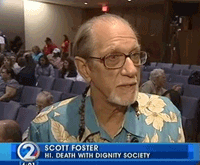 Supporters say they count on a new liberal administration to back it. Those against say not that much has changed over the years in what they call broad community opposition. Physician-assisted suicide has come up in legislative sessions every so often since the late 90’s and is back for its first hearing in years.
Supporters say they count on a new liberal administration to back it. Those against say not that much has changed over the years in what they call broad community opposition. Physician-assisted suicide has come up in legislative sessions every so often since the late 90’s and is back for its first hearing in years.
“This bill puts in some more safety measures than in the past. I think that the grander philosophical questions remain debatable though,” said Senator Josh Green … MORE TEXT WITH VIDEO
-###-
 February 8, 2011
February 8, 2011
Hawaii Legislature scuttles assisted suicide
By Mark Niesse
HONOLULU (AP) – A Hawaii legislative panel on Monday unanimously voted down a bill that would have legalized physician-assisted suicide for the terminally ill, ending the possibility that it would become law this year. MORE
-###-
Assisted suicide bill stalls
 Supporters say they count on a new liberal administration to back it. Those against say not that much has changed over the years in what they call broad community opposition. Physician-assisted suicide has come up in legislative sessions every so often since the late 90’s and is back for its first hearing in years.
Supporters say they count on a new liberal administration to back it. Those against say not that much has changed over the years in what they call broad community opposition. Physician-assisted suicide has come up in legislative sessions every so often since the late 90’s and is back for its first hearing in years.
“This bill puts in some more safety measures than in the past. I think that the grander philosophical questions remain debatable though,” said Senator Josh Green. MORE TEXT WITH VIDEO HERE
-###-
 February 8, 2011
February 8, 2011
Hawaii Legislature scuttles assisted suicide
By Mark Niesse
HONOLULU (AP) – A Hawaii legislative panel on Monday unanimously voted down a bill that would have legalized physician-assisted suicide for the terminally ill, ending the possibility that it would become law this year. MORE
-###-
Assisted suicide bill stalls
Emotional testimony fills a hearing on voluntary end of life
By B.J. Reyes
After citing numerous examples of loved ones who outlived a doctor’s terminal diagnosis or of their own victory over suicidal depression, opponents of a proposal to legalize physician-assisted suicide in Hawaii applauded as a Senate committee defeated the measure last night. The Senate Health Committee heard more than 4 1/2 hours of often-emotional public testimony before voting 4-0 to hold the bill in committee. MORE
-###-
![]()
Sunday 3 October 2010
Doctors and nurses launch campaign for right to help terminally ill to end their lives
New group will challenge medical bodies such as the BMA that oppose any change in the law on assisted suicide
LONDON — Leading doctors who endorse assisted dying for the terminally ill will this week launch an unprecedented campaign to change the law on the right to die. Healthcare Professionals for Change, a group of doctors, nurses and allied health professionals, says it wants to challenge bodies such as the British Medical Association, which opposes any change in the law that would allow others to help terminally ill people to die. The group is the first professional body of its kind to be set up with the explicit aim of changing the 1961 Suicide Act, which forbids such assistance. MORE
-###-
![]()
Dec 14, 2009
Husband’s suicide resurrects right to die debate
By Tim Sakahara
KAILUA, HAWAI`I – Days after allegedly shooting his dying wife, in an attempt to put her out of her misery the medical examiner confirms Robert Yagi has taken his own life. Police are tight-lipped tonight on why Yagi, who was apparently suicidal, was allowed to post bail Friday and go home. View video story and transcript HERE
-###-
Dec 14, 2009
Husband Ends His Life After Attempting to Take His Wife’s
Robert Yagi killed himself in his home after attempting to kill his ailing wife in the hospital. KITV News Video Here
-###-
Dec 14, 2009
Kailua Case Ignites Physician-Assisted Suicide Debate
Reported by Ron Mizutani
The Honolulu Medical Examiner confirmed Monday the man who tried to kill his terminally ill wife in her hospital bed last week has committed suicide. 71-year-old Robert Yagi was found dead Sunday in his Olomana home. Autopsy results show Yagi died from asphyxiation due to hanging. Yagi was free on bail after being charged with second-degree attempted murder, for shooting his wife with a flare gun last Tuesday night at Castle Medical Center. MORE
-###-
August 6, 2007
Assisted suicide attacked from an unlikely front


